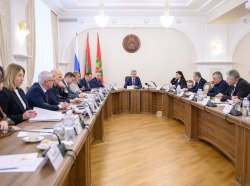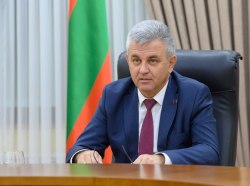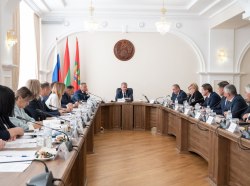Tiraspol, 11 April. /Novosti Pridnestrovya/. Agiotage in the foreign exchange market was created prior to the president's decree on regulation of foreign currency biddings and the central bank's official statement on the possibility of changing the currency corridor, said the chairman of the Pridnestrovian Republican Bank (PRB), Edward Kosovsky, at an extraordinary session of the Supreme Council.
People's deputies accused the central bank and the president of creating artificial agiotage in the foreign exchange market, which they believe have resulted in a currency deficit. According to them, the bank is not taking serious measures to stabilise the situation.
People's deputy Tidva called the currency crisis "a hand-made phenomenon" and characterised the central bank's actions as imitating struggle against the deficit by means of "faked measures".
Deputy Martynov is also sure that it is the central bank's statement about reviewing the currency corridor and the president's decree on regulation of currency biddings has caused panic in the foreign exchange market.
"We asked them to avoid rash actions, not to create panic and make a decision about the currency rate. However, a different decision was made without our knowledge. And the decision about a devaluation in the corridor of 14-16 roubles was leaked to the mass media, which alongside the president's decree has provoked panic in the foreign exchange market," said the MP.
The PRB's head, Edward Kosovsky, refuted deputies' accusations, emphasising that the destabilisation in the foreign exchange market had begun before the president's decree and official statements on rouble devaluation were released. These very measures, according to him, aimed to respond to the imbalance caused by already turbulent agiotage in the market which in turn resulted from negative expectations of Energokapital's contract for supplying power to Moldova.
On 2 March the main exporter of the Pridnestrovian electric power, reseller company Energokapital, contracted to supply electric power to Moldova, but the contract price was reduced by 28%. Back in February, however, the contract was under threat due to the emergence of Ukrainian companies in the Moldovan power supply market. The loss of the Moldovan market might bring about the loss of 50 - 70% of Pridnestrovie's budget revenues and a considerable reduction in currency receipts. To avoid it, Pridnestrovian suppliers had to offer more profitable conditions than did Ukrainian companies. As a result, Energokapital did win the contract but at a reduced price. However, negative expectations provoked vigorous expansion in demand for foreign currency. In several days currency reserves fell from $19 to 12 million.
"Finances favour silence. All debates in the central bank were held in silence – nothing was announced. There was no money prior to the president's decree. This means that either someone possessed insider information or there was a leak to the mass media. Mass demand for foreign currency had begun two days before the contract was signed," said Kosovsky.
"The central bank had been warning of the situation since the end of the last year. There were two State Council and Security Council meetings and a close session of the Supreme Council's praesidium during which we said what might happen, but the praesidium decided to avoid reviewing the parameters not to agitate the population and reconsider this issue when electric power prices change," underscored the head of the PRB.
According to Edward Kosovsky, the price changed a month earlier than projected. The contract was concluded on condition that the electric power price was reduced by 28% not since 1 April as planned bur from the beginning of March.
"The crisis broke out two days before 1 March. Currency was in vigorous demand. In two days before 1 March people bought out more foreign currency that in the previous month. Then in the first two days of March currency ran out. The president's decree was released after the central bank had run out of money," said Edward Kosovsky again.
The head of the bank explained that the presidential decree "provided for the establishment of interagency commission which can efficiently distribute money still coming in to the republic."
"The commission weeded out organisations which had several million dollars on their accounts and submitted requests for the purchase of currency anyway. The decree allowed us to efficiently use funds," explained Kosovsky. The same measure was taken in 1998, when the country faced the current account deficit, he recalled.
He also emphasised that the central bank had prepared for a possible reduction in currency earnings in advance. The approved package of measures had been drafted as early as February, but their implementation depended on decisions by the Supreme Council and the government.
Supreme Council deputies account the currency deficit for the activities of reseller company Energokapital, which, according to them, does not allocate all currency earnings to the country's reserve, but siphons them off to a certain offshore firm.
Edward Kosovsky underscored that Energokapital was established to be a financial converter. Moldavian GRES [power plant], according to him, is a Pridnestrovian resident and, taking account of the unrecognised status of our republic, cannot receive a licence for direct supplies of electric power. That is why international company Energokapital is used as a reseller.
"It is the non-resident that first gains receipts in Moldovan lei and then converts them into US dollars," he explained.
MPs disagreed with such a system of brokerage, arguing that Pridnestrovie's commercial banks, Agroprombank in particular, could convert lei into dollars.
"Moldavian GRES's problems could be settled by Pridnestrovie's commercial banks... Agroprombank offered his services, but unfortunately you chose another way," said people's council Vladislav Tidva.
At the same time, Edward Kosovsky declared, 12% of receipts had been lost before the establishment of Energokapital.
To conclude, let us recall the chronology of events in Pridnestrovie's foreign exchange market:
January-February 2016 – the central bank warns the government and the Supreme Council of a possible reduction in currency earnings due to fails to supply electric power to Moldova. Close meetings of the State Council and the Security Council are held.
Late February 2016 – agiotage in the foreign exchange market. In several days currency reserves decrease from $19 to 12 million.
2 March 2016 – media outlets report on a contract conclusion pursuant to which Energokapital will export electric power to Moldova. The supply price is reduced by 28%.
3 March – due to the imbalance between demand and supply (first 1 to 5 and then 1 to 10) in the market, the central bank is forced to stop holding currency biddings.
4 March 2016 – in order to stabilise supply in the foreign exchange market, the president signs a decree on holding of currency biddings no oftener than once a week. The decree is to be in effect until the Supreme Council adopts decision on monetary policy.
5 March 2016 – the central bank approves a package of measures aimed at stabilising the domestic currency market and maintaining the stability of Pridnestrovie's national currency.
14 March 2016 – at State Council and Security Council meetings the head of the central bank proposes variants of overcoming the currency deficit. Among these measures is the change of the currency corridor to 14-16 roubles per $1.
15 March 2016 – the Pridnestrovian rouble reaches the limit of the currency corridor at 11.30 roubles per $1.
20 March – the mass media reports on the Kurs 2016 operation. The country's law enforcement agencies and the PRB make checks of exchange offices and expose currency speculations. Over 30 violations are documented.
25 March – after the recalculation of the government's projected data the central bank proposes a new current corridor of 12.25-12.70 roubles.
25 March – the Supreme Council rejects the central bank's proposal to change the currency corridor. Agroprombank offers a $10 million interest-free loan to cover the currency deficit on a number of conditions among which is the optimisation of customs tariffs. The PRB says this amount is sufficient for only one bidding day, and the macroeconomic situation does not does not forecast currency receipts in the mid-run.
29 March – following the Supreme Council's decision to retain the currency corridor, the president revokes his decree on measures to stabilising the situation in the domestic currency market. At the same time, the central bank cannot meet demands for currency which exceeds $12 million at currency biddings.
29 March - the president signs into law a decree on mandatory sale of 7% of currency earnings.
11 April - aggregate demand exceeds $10 million at the PRB's currency bidding. The central bank is still lacking money to meet demands.








